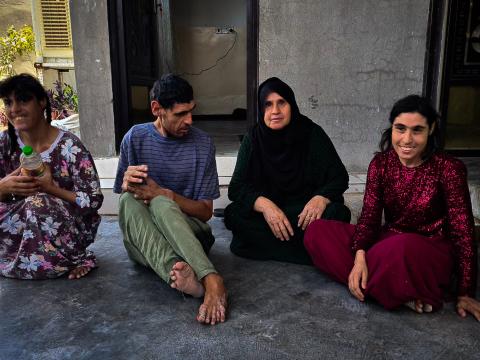Naima’s need for financial support to sustain a life for her children

Naima, 56, is the mother of four children and lives in the heart of Tooz. Three of Naima’s children are suffering from disabilities and need ongoing treatment.
Naima married when she was in her twenties. Naima’s husband was running a small business then. Unfortunately, after many years spent together, Naima’s husband was diagnosed with cancer. He fought the disease for six months and died in 2004.
Since then, Naima has been living with her children in the village of Sulaiman Beg, 24.7 km away from Tooz. During the conflict of 2014, she was displaced with her children, along with her brother’s family, to Tooz. Naima has been relying on government social care, charitable people, and her younger son of twenty-one years of age who studies and works to bring income to the family. Naima said, “People collected money for us and helped us with building this home. It is a very difficult situation with my children. I feed them myself and I cannot go out for more than half of the day to the bazaar or the doctor unless their brother stays with them. I cannot leave them alone. They cannot eat and drink by themselves. My son or I must be there to feed them.”
As a young child, Naima completed sixth year of primary school and dropped out shortly thereafter. She then started to work on the farm helping with harvesting and caring for sheep and later worked many odd jobs to make ends meet for herself and her family. However, these days, she feels that she must be around the house most of the time to care for her three children living with disabilities.
Naima, like many other Iraqi women, is highly constrained by traditional gender roles and socio-economic barriers in Iraq. UN Women reports that Iraqi women’s workforce participation remains one of the lowest in the world, and healthcare access, especially in conflict-affected areas, is limited. The situation is particularly dire in Tooz District, which has been severely impacted by displacement due to the conflict of 2014.
According to the Iraq Development Management Centre, only 31% of women in Tooz participate in the formal labor market. Local NGOs, including the Women’s Empowerment Organization, highlight inadequate access to education and vocational training as major issues.
Naima has difficulties not only with generating income for her family, but also in accessing services for her children’s need. Services are very limited in Tooz for persons living with disabilities: two of her children suffer from intellectual disabilities while one son lives with paralysis and intellectual disabilities. Naima tells us that she needs monthly treatment for her children. While she receives a social care benefit from the government, it is not enough to meet their daily basic needs.
Small livelihoods initiatives that Naima can run within the confines of her home will help her become more financially independent and help secure the monthly treatment cost for her children and daily spending on essentials.
The legacy of conflict upon already vulnerable people - women, girls, and people living with disabilities - is an even more precarious situation, while limited opportunities and access to services and facilities are ongoing challenges. World Vision Iraq therefore seeks potential partnerships and funding opportunities further to help Iraqi people living with disabilities, women and girls at risk.